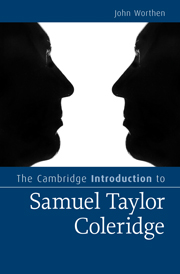Book contents
- Frontmatter
- Contents
- Illustrations
- Preface
- Acknowledgements
- Abbreviations
- Chapter 1 Early life and contexts: 1772–1802
- Chapter 2 Poetry
- Chapter 3 Notebooks
- Chapter 4 Mid-life works and contexts: 1803–1814
- Chapter 5 Language
- Chapter 6 Criticism
- Chapter 7 Later works and contexts: 1815–1834
- Afterword
- Notes
- Further reading
- Index
- Cambridge Introductions to Literature
Preface
Published online by Cambridge University Press: 05 August 2012
- Frontmatter
- Contents
- Illustrations
- Preface
- Acknowledgements
- Abbreviations
- Chapter 1 Early life and contexts: 1772–1802
- Chapter 2 Poetry
- Chapter 3 Notebooks
- Chapter 4 Mid-life works and contexts: 1803–1814
- Chapter 5 Language
- Chapter 6 Criticism
- Chapter 7 Later works and contexts: 1815–1834
- Afterword
- Notes
- Further reading
- Index
- Cambridge Introductions to Literature
Summary
Down to the middle of the twentieth century, it was as a tragic, procrastinating, marvellous failure that Samuel Taylor Coleridge was most easily perceived. His great enemy the writer William Hazlitt had helped cement Coleridge's reputation as the ridiculously unproductive author of a few famous poems, the rambling prose book Biographia Literaria and a couple of religious polemics – nothing else surviving of him save memories of his irrepressible talk.
Today, seeing his collected works stretching out on library shelves in fifty volumes, readers are less likely to assume that he failed to write much. The twenty-first century has not only judged Coleridge to be the author of some great poetry and prose (‘Kubla Khan’, ‘The Rime of the Ancient Mariner’, ‘Christabel’, Biographia Literaria, for sure) but has come to view him and his poetry as iconic. The ‘person from Porlock’ who interrupted the writing of ‘Kubla Khan’ is a figure of mythic dimension, ‘The Ancient Mariner’ can today be found in many places and forms (illustrations by Gustave Doré, a song by Iron Maiden, a film by Raul daSilva, a gift shop in San Diego), while everywhere on the web are versions of a haunting Coleridge notebook entry: ‘If a man could pass thro’ Paradise in a Dream, & have a flower presented to him as a pledge that his Soul had really been there, & found that flower in his hand when he awoke – Aye! and what then?’
- Type
- Chapter
- Information
- Publisher: Cambridge University PressPrint publication year: 2010

